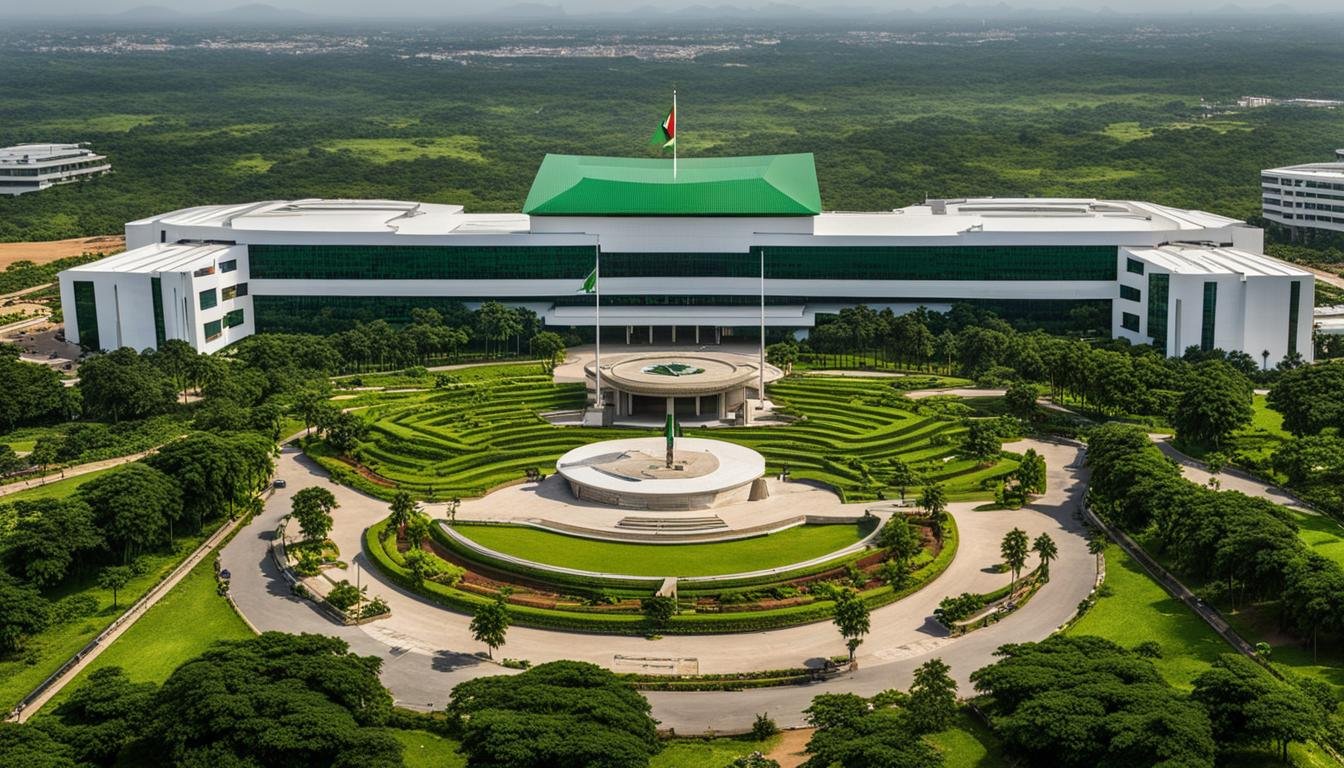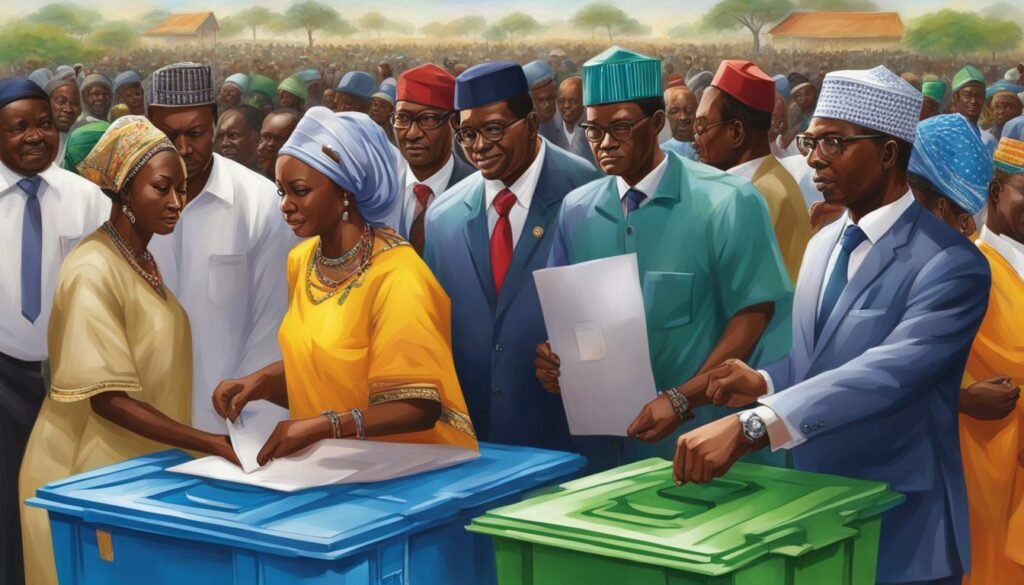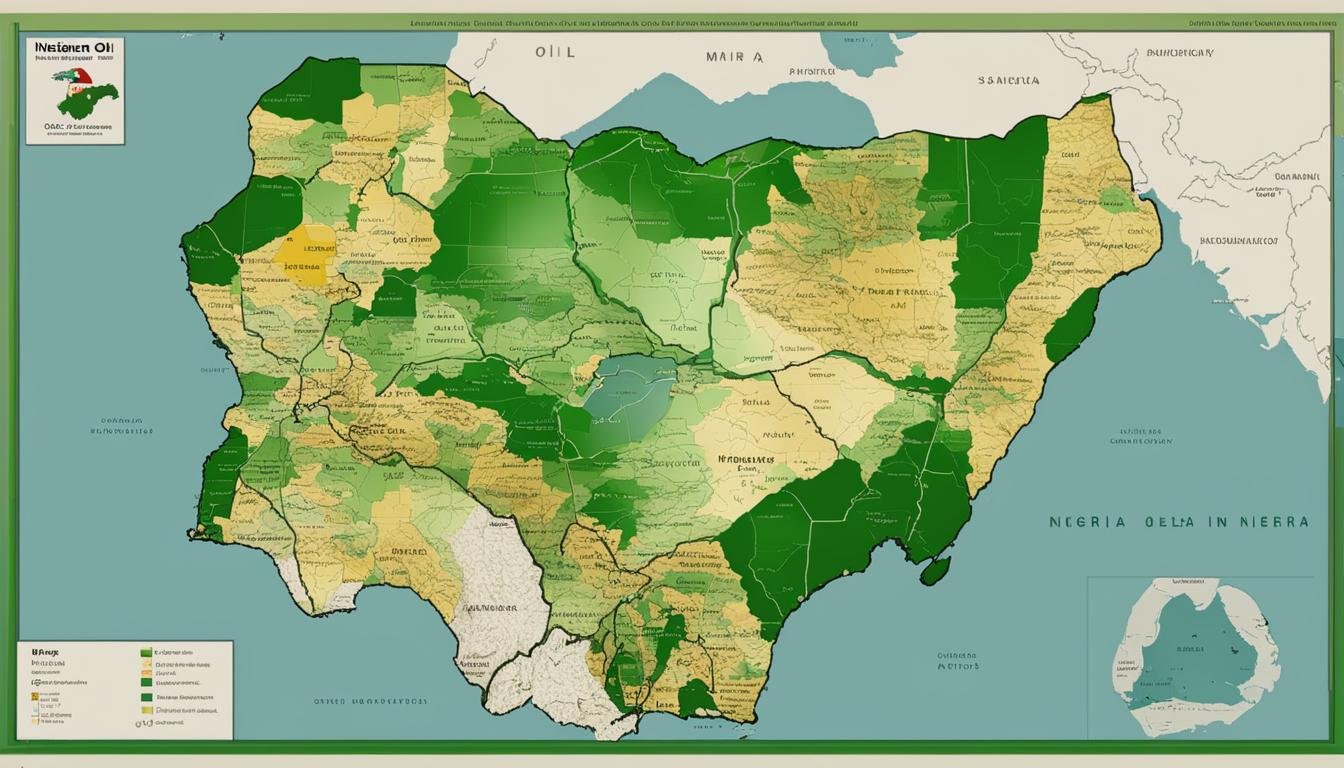Welcome to our comprehensive guide on the Federal Government of Nigeria. As the highest governing body in the country, the Federal Government plays a critical role in shaping policies, providing services, and overseeing the affairs of the nation. In this article, we will delve into the structure, functions, and significant aspects of the Nigerian Federal Government, shedding light on its historical foundations, legislative branch, executive arm, judiciary system, and more. Whether you are a citizen, a student, or a curious observer, this guide will provide you with valuable insights into the workings of the Nigerian government.
Key Takeaways:
- The Federal Government of Nigeria is the governing body established by the Constitution of Nigeria to manage public affairs, enforce laws, and provide essential services to the Nigerian people.
- It is composed of three branches: the legislative, the executive, and the judicial, with each branch having specific powers and functions.
- The legislative branch consists of the National Assembly, responsible for making laws and conducting oversight of the executive arm of government.
- The executive arm is headed by the President of Nigeria, who appoints ministers to lead various government departments and agencies.
- The judiciary system upholds the rule of law in Nigeria and includes the Supreme Court, Sharia courts, and customary courts.
The Structure and Evolution of the Federal Government of Nigeria
The Federal Government of Nigeria has a structured system that has evolved over time, shaped by its historical foundations, constitutional basis, and the distribution of power among its three branches. Understanding the structure and evolution of the government is essential to grasp its functions and responsibilities.
Historical Foundations: From Colonial Rule to Independence
The Federal Government of Nigeria traces its roots back to the period of colonial rule. Nigeria gained independence from British colonial rule on October 1, 1960, marking the beginning of its journey as an independent nation. This milestone event marked the establishment of the government as we know it today.
Nigeria’s Constitutional Basis and Its Amendments
The Nigerian Constitution serves as the basis for the Federal Government’s operations and governance. The Constitution outlines the powers and functions of each branch of government, ensuring a system of checks and balances to prevent the concentration of power. Over the years, the Constitution has been amended to adapt to the changing needs and aspirations of the Nigerian people.
The Three Branches of Government: A Power Distribution
The Federal Government of Nigeria is structured into three distinct branches: the legislative, the executive, and the judicial. Each branch has its own roles and responsibilities, ensuring the separation of powers and providing a system of checks and balances.
The legislative branch, represented by the National Assembly, is responsible for making laws, approving budgets, and overseeing government activities. This branch is crucial for representing the interests of the Nigerian people and ensuring their concerns are addressed.
The executive branch, led by the President of Nigeria, is responsible for implementing and enforcing laws, managing public affairs, and executing government policies. The President appoints ministers who head various government departments and agencies, working collectively to serve the Nigerian people.
The judicial branch, headed by the Supreme Court, is responsible for interpreting the law, ensuring justice, and safeguarding the rights of individuals. The courts play a crucial role in upholding the rule of law and resolving legal disputes.
Understanding the structure and evolution of the Federal Government of Nigeria is essential for comprehending its functioning and the checks and balances embedded within its system. This ensures effective governance and the protection of the rights and aspirations of the Nigerian people.
An Overview of the Legislative Branch in Nigeria
The legislative branch of the Federal Government of Nigeria is known as the National Assembly. It plays a crucial role in the governance of the country by making laws and overseeing government activities. The National Assembly is a bicameral body, consisting of two chambers: the Senate and the House of Representatives.
National Assembly: Roles and Responsibilities
The National Assembly is responsible for initiating, debating, and passing bills that become laws, which directly impact the Nigerian people. It also conducts investigations and oversight of the executive arm of government to ensure transparency and accountability. The National Assembly represents the interests of the Nigerian citizens and plays a vital role in shaping the policies and direction of the country.
Senate and House of Representatives: Composition and Leadership
The Senate is made up of representatives from each state in Nigeria, while the House of Representatives is composed of representatives based on population. Each member of the National Assembly is elected by the people they represent. The leadership positions in the National Assembly are crucial, as they guide the legislative agenda and represent the interests of their respective chambers. The National Assembly is headed by the Senate President and the Speaker of the House of Representatives, who are elected by the members of their chambers.
| Senate | House of Representatives |
|---|---|
| Composed of representatives from each state | Composed of representatives based on population |
| Handles legislative matters at the national level | Represents the interests of the Nigerian people |
| Chaired by the Senate President | Chaired by the Speaker of the House of Representatives |
The National Assembly holds a significant position in the political structure of Nigeria, ensuring that the legislative branch operates as a check on the executive arm of government. Through its roles and responsibilities, it works to uphold the principles of democracy and represent the diverse voices of the Nigerian people.
The Executive Arm of Government Nigeria: Powers and Functions
The executive arm of the Federal Government of Nigeria is responsible for implementing and enforcing laws, as well as managing the day-to-day affairs of the government. It plays a crucial role in ensuring the smooth functioning and effective governance of Nigeria. Led by the President of Nigeria, who is the head of state and the commander-in-chief of the armed forces, the executive arm carries out various key functions and responsibilities.
The President appoints ministers to head various government departments and agencies, each responsible for specific areas of governance. These departments and agencies serve as vital pillars in the functioning of the government, overseeing and managing different aspects of public administration.
The executive arm of government in Nigeria is involved in formulating and implementing government policies, which guide the development and growth of the nation. It plays a significant role in managing federal projects, ensuring their successful execution and completion. These projects span various sectors such as infrastructure, health, education, agriculture, and more, ultimately aiming to enhance the overall well-being of the Nigerian people.
Furthermore, the executive arm is responsible for delivering government services to the Nigerian population. These services encompass a wide range of areas, including but not limited to healthcare, education, transportation, security, and social welfare. By providing essential services, the government aims to improve the quality of life for its citizens, promoting their welfare and ensuring their basic needs are met.
The executive arm of the Federal Government also collaborates with federal government agencies to achieve its goals and objectives. These agencies have specific mandates and functions, and they collaborate with the executive arm to implement policies and programs effectively. By working together, the government and its agencies strive to provide efficient and effective services to the Nigerian people, promoting national development and progress.
The executive arm of government in Nigeria plays a pivotal role in shaping the nation’s governance and development. Through its powers and functions, it drives the implementation of policies and projects, ensuring the well-being of the Nigerian people. By prioritizing efficient service delivery and effective management of resources, the executive arm aims to foster sustainable growth, progress, and prosperity for all Nigerians.
Nigeria’s Administrative Divisions: States and Local Government Areas
Nigeria, as a country, is divided into different administrative divisions to ensure effective governance and service delivery. These divisions include states and local government areas, each with its own unique responsibilities and functions.
The states in Nigeria are organized into six geo-political zones, namely:
- North-Central
- North-East
- North-West
- South-East
- South-South
- South-West
Each geo-political zone consists of several states, totaling 36 states in the entire country. The states have their own governance structure, led by elected governors and state houses of assembly. They play a significant role in implementing government policies and delivering essential services to the people.
Furthermore, Nigeria has over 770 local government areas, which are responsible for grassroots-level administration. These areas are governed by councilors and chairpersons who work closely with the state governments to ensure effective governance and service delivery at the local level.
The administrative divisions in Nigeria, comprising states and local government areas, are vital for public administration and the efficient delivery of government services to the Nigerian people.
Nigeria’s Geo-political Zones and Number of States
| Geo-political Zone | Number of States |
|---|---|
| North-Central | 6 |
| North-East | 6 |
| North-West | 7 |
| South-East | 5 |
| South-South | 6 |
| South-West | 6 |
Judiciary System in Nigeria: Courts and Legal Framework
The judiciary system in Nigeria plays a crucial role in upholding the rule of law and ensuring the administration of justice in the country. It consists of a comprehensive network of courts and legal frameworks that provide a fair and impartial system for resolving disputes and enforcing laws.
The Supreme Court: Apex of the Judicial Hierarchy
“The Supreme Court may be said to be the ultimate hope of all litigants, where contentious issues are finally laid to rest.” – Justice Walter Onnoghen
The Supreme Court of Nigeria holds the highest position within the judicial hierarchy. As the final appellate court for both civil and criminal matters, it has the power to interpret the Constitution and make binding decisions that impact the legal landscape of the country. The Supreme Court consists of the Chief Justice of Nigeria and a panel of justices appointed by the President.
Appeals from lower courts are brought before the Supreme Court, and its decisions set important precedents that guide future legal cases. The court’s role in interpreting the Constitution ensures its adherence to the principles of justice and equality.
Sharia and Customary Courts: Traditional Justice Systems
In addition to the regular courts, Nigeria also has Sharia and customary courts that handle cases based on Islamic and traditional customary laws, respectively. These courts operate alongside the general legal system and play a significant role in resolving disputes in accordance with religious and cultural practices.
Sharia courts, which operate primarily in the northern states of Nigeria, handle cases involving Islamic law, particularly in matters relating to family, marriage, and inheritance. The judges in these courts are well-versed in Islamic law and apply its principles in resolving disputes.
Customary courts, on the other hand, are established to address issues arising from customary laws and traditions prevalent in different ethnic groups within Nigeria. These courts handle cases related to land disputes, inheritance, divorce, and other matters governed by customary practices. The judges in customary courts are knowledgeable about the customs and traditions of the respective communities they serve.
The diverse court system of Nigeria, consisting of the Supreme Court, Sharia courts, and customary courts, reflects the country’s commitment to ensuring access to justice for all its citizens. It recognizes the importance of incorporating religious and customary practices into the legal system while maintaining the integrity of the overall judiciary.
Electoral System and Political Participation in Nigeria
Electoral Commission and the Sanctity of the Vote
The electoral system in Nigeria plays a crucial role in ensuring the political participation of its citizens. Central to this system is the Independent National Electoral Commission (INEC), which is responsible for organizing and conducting elections in the country. The INEC’s primary goal is to ensure the sanctity of the vote and uphold the democratic process.
As an independent body, the INEC plays a vital role in ensuring free, fair, and credible elections in Nigeria. It is responsible for voter registration, delimitation of electoral constituencies, voter education, and the management of electoral materials. The commission works diligently to maintain transparency, impartiality, and integrity throughout the electoral process.
Through its efforts, the INEC promotes inclusivity and encourages political participation among Nigerians. By providing equal opportunities for citizens to exercise their voting rights, the INEC helps shape a democratic society where every voice counts.
The Struggle for Fair and Free Elections
Nigeria has made significant progress in holding fair and free elections; however, challenges and controversies persist. Over the years, the country has experienced electoral malpractices such as voter intimidation, electoral violence, voter fraud, and other irregularities.
Recognizing the importance of fair and free elections, the Nigerian government, civil society organizations, and international partners continually work to address these challenges. Efforts include comprehensive election reforms, voter education campaigns, improved voter registration processes, and the deployment of security personnel to ensure a safe and peaceful electoral environment.
Despite these efforts, the road to achieving truly fair and free elections in Nigeria remains a continuous process. The government and stakeholders must remain vigilant in their commitment to upholding democratic values, strengthening the electoral system, and nurturing a culture of political participation among Nigerians.
| Key Challenges | Efforts and Solutions |
|---|---|
| Voter intimidation and violence | – Deployment of security personnel to polling stations – Collaboration with security agencies to combat violence – Voter education programs to inform citizens about their rights and responsibilities |
| Electoral fraud and irregularities | – Comprehensive election reforms to enhance accountability and transparency – Strengthening of legal frameworks and enforcement mechanisms – Use of technology in the electoral process to minimize human errors and manipulation |
| Limited political participation | – Voter education campaigns to encourage citizen engagement – Civic awareness programs to promote political consciousness and active participation – Inclusive and transparent political processes that foster citizen trust and confidence |
Through collective efforts, Nigeria aims to overcome these challenges and establish a robust electoral system that truly reflects the will of the people. By ensuring fair and free elections, the country can strengthen its democratic foundations, foster political stability, and work towards a more prosperous future for all Nigerians.
Nigeria’s Place on the International Stage: Foreign Relations and Diplomacy
Nigeria is actively engaged in foreign relations and diplomacy, playing a prominent role on the international stage. The country seeks to foster regional partnerships and build alliances with nations worldwide to promote peace, security, and development. Through its diplomatic efforts, Nigeria aims to project its interests and contribute to global goals and aspirations.
Regional Partnerships and International Alliances
Nigeria recognizes the importance of regional cooperation in achieving common objectives. The country actively participates in regional organizations such as the Economic Community of West African States (ECOWAS) and the African Union (AU). These partnerships provide platforms for dialogue, collaboration, and coordination on regional integration, peace and security, economic development, and social welfare. Nigeria’s engagement in regional partnerships strengthens its position as a key player in the West African sub-region and the African continent as a whole.
Contributions to Peacekeeping and Global Dialogue
Nigeria is committed to promoting global peace and security. The country actively contributes to peacekeeping efforts under the auspices of the United Nations and regional organizations. Nigerian peacekeepers have served in various conflict zones, playing a vital role in maintaining stability and facilitating post-conflict reconstruction. Nigeria’s contributions to peacekeeping underscore its dedication to global peace and its aspiration to build a safer and more secure world.
Furthermore, Nigeria actively participates in global dialogue on important issues of common concern. Through diplomatic channels and international conferences, Nigeria engages in discussions on topics such as climate change, human rights, sustainable development, and global governance. By voicing its perspectives and collaborating with other nations, Nigeria contributes to shaping international norms and policies.
In conclusion, Nigeria’s active engagement in foreign relations and diplomacy demonstrates its commitment to regional and global cooperation. Through regional partnerships, international alliances, peacekeeping efforts, and participation in global dialogue, Nigeria strives to promote peace, security, and development. The government of Nigeria, along with its dedicated officials, plays a vital role in representing the interests of the Nigerian people on the international stage and contributing to the advancement of global goals and aspirations.
Conclusion
In conclusion, the Federal Government of Nigeria serves as the highest authority in the country, entrusted with the responsibility of governing and providing essential services to its citizens. Through the three branches of government – the legislative, the executive, and the judicial – the government ensures a system of checks and balances, safeguarding the democratic process and upholding the rule of law.
As the government continues to evolve in response to changing political and social landscapes, Nigeria’s administrative divisions, electoral system, judiciary system, and foreign relations play crucial roles in shaping the overall governance and development of the nation. The state and local governments, in partnership with the federal government, strive to deliver essential services to the Nigerian people, enhancing their quality of life and contributing to national progress.
In its pursuit of a thriving democracy, the government remains focused on promoting democratic values, fostering regional partnerships, promoting international alliances, and contributing to peacekeeping efforts. With the overarching goal of improving the lives of the Nigerian people, the Federal Government of Nigeria is committed to creating a conducive environment for growth, stability, and prosperity for the nation and its citizens.
FAQ
What is the Federal Government of Nigeria?
The Federal Government of Nigeria is the governing body of the country, established by the Constitution of Nigeria. It is responsible for making and enforcing laws, managing public affairs, and providing essential services to the Nigerian people.
How is the Federal Government structured?
The Federal Government of Nigeria is composed of three branches: the legislative, the executive, and the judicial. Each branch has distinct powers and responsibilities to ensure a system of checks and balances.
What is the role of the legislative branch?
The legislative branch, known as the National Assembly, is responsible for making laws and overseeing government activities. It consists of two chambers: the Senate and the House of Representatives.
Who leads the executive arm of government?
The executive arm is led by the President of Nigeria, who is the head of state and the commander-in-chief of the armed forces. The President appoints ministers to head various government departments and agencies.
How are Nigeria’s states and local government areas governed?
Nigeria is divided into states and local government areas for administrative purposes. The states have elected governors and state houses of assembly, while the local government areas are governed by councilors and chairpersons.
What is the role of the judiciary system in Nigeria?
The judiciary system in Nigeria upholds the rule of law and administers justice. It consists of various courts, including the Supreme Court, which is the highest court in the country.
How does Nigeria conduct elections?
Elections in Nigeria are organized and conducted by the Independent National Electoral Commission (INEC). INEC ensures the sanctity of the vote and safeguards the democratic process.
How does Nigeria engage internationally?
Nigeria plays an active role in foreign relations and diplomacy. It seeks regional partnerships and international alliances to promote peace, security, and development. Nigeria is a member of various international organizations and contributes to peacekeeping efforts.




![Saudi Oil Industry Key Stats Unveiled [2024] 3 Saudi Oil Industry Key Stats](https://zoets.b-cdn.net/wp-content/uploads/2024/02/h.jpg)






